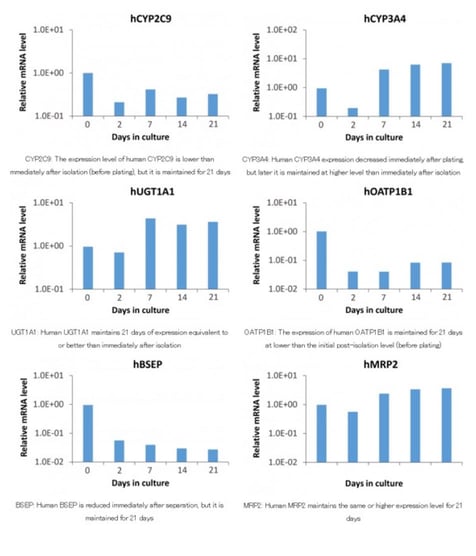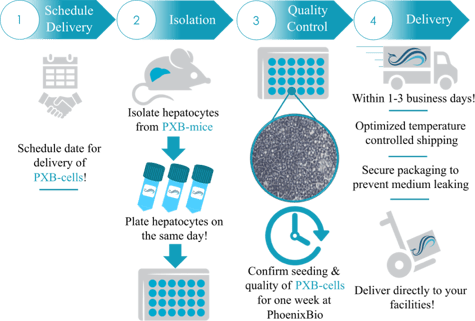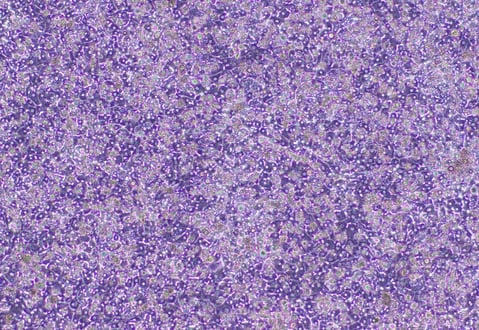PXB-cells®
Increased translational potential via high quality and fresh on-demand human hepatocytes
In vitro experiments don’t have to produce results that are disconnected from human physiology. With PXB-cells®, you can model human cell biology in your in vitro experiments, enabling you to progress confidently to in vivo studies. Moreover, because PXB-cells® and PXB-mice have the same source of donor hepatocytes, you can directly compare between in vitro cell data and in vivo data collected from PXB-mice.
PXB-cells® are ~95% pure human hepatocytes freshly isolated from the PXB-mouse®. Their high human-specific enzyme and transporter activity can be maintained long-term, providing a superior in vitro model system of the human liver environment. Our stable supply of on-demand PXB-cells® enables you to perform reproducible experiments using the same source of donor hepatocytes.
Applications
PXB-cells® are ideally suited for studies which require the use of primary human hepatocytes, such as drug metabolism, enzyme induction/inhibition, safety assessment, transporter evaluation, anti-HBV therapeutics efficacy testing and other studies.
Why use PXB-cells®?
PXB-cells®: hepatocytes with human gene and enzyme expression
- Consistent supply from the same human donor
- Long-term culture stability: up to 40 days or more
- Confirmed activities of enzymes and transporters
-
Can be infected with Hepatitis B Virus (HBV)
-
Produce similar lipoprotein profiles to humans
-
Suitable for 3D cell culture or other culture systems
- Ability to test the same human donor both in vitro (PXB-cells) and and in vivo (PXB-mouse)


Expression of human genes and enzymes in PXB-cells®
PXB-cells® have high and stable expression of human genes and proteins, enabling you to model how your drug performs in human hepatocytes. PXB-cells® demonstrate high and stable expression of important phase I and II metabolic enzymes and transporters:
PXB-cells® supply process
PhoenixBio delivers PXB-cells® in various plate and flask formats under temperature-controlled conditions (15-25°C). We also provide dHCGM media (-FBS) to maintain the optimal culture conditions of your fresh PXB-cells.

Available PXB-cells® formats |
|
24-well plate |
1.0 x 107 cells per plate |
96-well plate |
6.5 x 106 cells per plate |
T75 flask |
1.6 x 107 cells per flask |
*Please note that you can re-plate PXB-cells® to your preferred formats from T75 flasks. We will provide a protocol for the plating procedures upon request.
For any questions on our fulfillment policy, please see details prior to ordering here: Fulfillment Policy

See how PXB-cells® have been used in other studies
Our PXB-cells® have helped to drive hundreds of drug discovery projects over the last decade and enabled organizations to achieve accurate human liver data.
Blog Review: Cutting Edge Gene Editing in Primary Human Hepatocytes
This blog review covers data from organizations that utilized PXB-cells in new approaches including base-editing, epigenetic editing, and large-scale gene editing. The following is covered in more detail in the review:
- Targeting HBV with Base Editing
- Methods to Tackle Large Scale Gene Editing
- Reversible Gene Silencing with Epigenetic Editing
Case study: Mitochondrial toxicity with PXB-cells®
- The mitochondrial function of cryopreserved human hepatocytes (CHH) and PXB-cells® were directly compared
- PXB-cells® outperformed CHH lots in terms of energy metabolism and mitochondrial function

Get in Touch
Contact us to find out how the PhoenixBio team could help your drug discovery and development projects today.